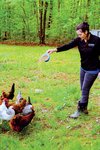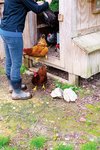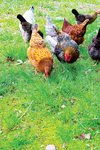




When Victoria Brewer started her job two years ago as an administrative assistant with Chatham County Agricultural Extension, she didn’t know it would later lead to her dream job — or that one day she’d have a role in teaching more than a thousand students from around the world.
As someone who has raised chickens at her home just outside of Siler City for years, Brewer seized the opportunity, early in her time as an administrative assistant with Extension, to accept when asked to assist with the county’s 4-H Chicken Embryology Program.
A year later, Brewer is Chatham County’s 4-H Youth Development Extension Agent — which is another role at the Agricultural Extension — and she’s currently leading and expanding the embryology program near to her heart to reach educators and students not only in Chatham but across the country and the world.
For eight years, Chatham County 4-H has partnered with the Pittsboro-based nonprofit Livestock Conservancy to provide Chatham County elementary school teachers with free equipment and guidance to teach their students about the life cycle of chicken eggs. The Livestock Conservancy, which focuses on protecting endangered livestock and poultry breeds — also called heritage breeds — from extinction, provides the program with fertilized eggs and this year is assisting with programming.
Prior to the shutdown of schools under N.C. Gov. Roy Cooper’s order on March 14, the program had 20 teachers registered for the program. After the order, Jeannette Beranger, the senior program manager for the Conservancy, approached Chatham County Agriculture Extension about continuing the program virtually.
The team decided that the best way to move forward would be to create pre-recorded YouTube videos and provide optional assignments for teachers during distance learning. Brewer and Beranger would take turns producing the 12 individual lessons for the four-week series.
After announcing the free online program, registrations jumped to nearly 1,000 people from 46 states and four countries including Mexico, Canada and Australia.
“A lot of those registered are teachers,” Brewer said. “We’ve asked them to send as much information about their students so that we can learn who they are and make sure that our organization is serving citizens of all communities and providing beneficial programming to diverse audiences.”
For Brewer, it was her first time producing and editing videos. Serendipitously, the N.C. State Cooperative Extension had offered a two-day class on video editing last May. Brewer attended the sessions to increase her skills, though admittedly, she wasn’t sure at that time how she might be using them in the future. Less than a year later, she was putting her new video skills to the test.
Brewer converted the den in her home into a makeshift studio. She’s placed dark screens on her windows to prevent light fluctuations that could interfere with filming. Using Post-it Notes, she covered her walls with instructive graphics she drew herself. There she records videos which include a deep dive into the incubation process and the embryonic life cycle of chicken eggs, including how to take care of chicks and “tidbits” of information for when those chicks grow into chickens for the 4-H Embryology Program.
“It took some time turning my house into a studio,” Brewer said. “And to learn how to video myself and edit it. It required me to step outside of my comfort zone and learn new skills.”
Her first videos were edited by Tiffany Hancock, the county Extension’s marketing and media support specialist. But because the video needs of the entire Extension’s office has expanded, Brewer started editing the videos on her own using iPhone applications.
Beranger, likewise, has made adjustments in her home to accommodate the new task. She’s converted two of the three bedrooms in her home for use in creating the instructional videos. She purchased video editing software that she is “just starting to learn” to make the videos as professional as possible. She is also working to get each of the videos close-captioned so those with learning deficits can still participate and learn.
“We’re developing a whole bunch of programming that will be web-based,” Beranger said. “It’s a lot of work. Producing a 12-minute video can take days to get done.”
Despite all the work, both women are determined to continue to serve the teachers and students who use the program.
“There was a survey several years ago of teachers who took part in the program,” Beranger said. “The level of absenteeism went down to almost zero and science grades improved. Kids had an increased interest in science and agriculture. It was a highlight for the kids and it had a meaningful impact. And it is an opportunity to teach kids where food comes from.”
“This program touched a place in my heart,” Brewer said. “This program was my first experience with 4-H and where I realized it was my dream job. This is my opportunity to share this program that is so special to me. And we’re able to share it beyond county or state boundaries. That’s why it’s so exciting and fulfilling, but also a little scary. To think about the nearly one thousand people across the world...it’s crazy. It takes time, but it’s worth it.”
Casey Mann can be reached at CaseyMann@Chathamnr.com.